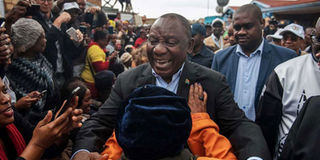Key parties in South Africa's elections

Cyril Ramaphosa, President of South Africa and the African National Congress, greets a voter as he arrives to cast his vote for the general elections at the Hitekani Primary School, Chiawelo, Soweto, on May 8, 2019. PHOTO | MICHELE SPATARI | AFP
What you need to know:
- The African National Congress rose from a liberation movement to govern Africa's most industrialised country, but its once-glorious image has been tainted by its record in office.
- The Democratic Alliance was established in 2000 as a merger of three "white" parties.
- The Economic Freedom Fighters party was created in 2013 by the firebrand ex-ANC youth leader Julius Malema, shortly after he was expelled from the ruling party.
- The conservative and predominantly white Freedom Front Plus party was founded in 1994 during the negotiations to end apartheid and emerged as the fourth biggest party in the first democratic polls.
JOHANNESBURG,
A potpourri of 48 political parties contested South Africa's general election -- a record number.
Here are snapshots of some of the front-runners as the votes were still being counted on Thursday:
RULING ANC
The African National Congress rose from a liberation movement to govern Africa's most industrialised country, but its once-glorious image has been tainted by its record in office.
It was founded in Bloemfontein in 1912 to fight against the white minority government's restrictions on free movement and land ownership by blacks.
During the anti-apartheid struggle, the ANC espoused socialist values and had many communist members, but it has adopted a more liberal economic programme after coming to power.
It has easily won all post-apartheid elections and has a stranglehold on parliament, where it has held over 60 percent of the 400 seats since the dawn of democracy.
It went into the elections under Cyril Ramaphosa who took over less than 18 months ago from Jacob Zuma, whose rule was defined by corruption among party and government officials, and weak economic growth.
DEMOCRATIC ALLIANCE
The Democratic Alliance was established in 2000 as a merger of three "white" parties.
One among these was the former Democratic Party, which had opposed the then-ruling National Party in parliament, and another the New National Party -- which had tried, unsuccessfully, to distance itself from its predecessor's racist past.
The DA has been the largest opposition party for nearly two decades, with 89 seats in the outgoing parliament.
Long viewed as the party for middle-class whites, the DA contested an election for the first time under a black leader -- Mmusi Maimane, who took the reins in 2015.

Mmusi Maimane, leader of South African main opposition party Democratic Alliance (DA), leaves a voting station after casting his vote for the general elections at the Presbyterian Church in Dobsonville, Johannesburg on May 8, 2019. PHOTO | MICHELE SPATARI | AFP
FREEDOM FIGHTERS
The Economic Freedom Fighters party was created in 2013 by the firebrand ex-ANC youth leader Julius Malema, shortly after he was expelled from the ruling party.
His new party took 25 seats in parliament in 2014 and polls suggest it could nearly double that by tapping into the anger of millions of poor, unemployed black South Africans.
The EFF describes itself as a "radical and militant economic emancipation movement" and its flagship policy is to seize land from white owners without compensation to give to poor blacks.
The anti-capitalist party also advocates for the nationalisation of mines and banks.
Founded in 1975 as a political and cultural movement, it transformed into a political party 15 years later and has had only one leader: Mangosuthu Buthelezi, 90.
It is motivated by Black Conciousness political ideology and derives most of its support from the Zulu ethnic group in the southeastern KwaZulu-Natal province.
In the first non-racial elections in 1994, the IFP won 43 seats -- but its showing dwindled to just 10 seats in the last vote in 2014.

Julius Malema, leader of South Africa's radical left Economic Freedom Fighters party, acknowledges the crowd at the Orlando Stadium in Soweto, Johannesburg, during the final EFF presidential campaign rally on May 5, 2019 ahead of May 8 legislative and presidential elections. PHOTO | MICHELE SPATARI | AFP
FREEDOM FRONT
The conservative and predominantly white Freedom Front Plus party was founded in 1994 during the negotiations to end apartheid and emerged as the fourth biggest party in the first democratic polls.
It advocates strongly for Afrikaans language rights and against black empowerment schemes. It also opposes efforts to redistribute land which remains largely in the hands of white owners.
It won four parliamentary seats in 2014's elections and has performed better than expected in early counting following Wednesday's poll.
The Good party was formed just six months ago by Patricia De Lille, a former DA mayor in the city of Cape Town who had split from the DA in an acrimonious row.
It could take some of the DA support base in the Western Cape, but its political potential is as yet untested.

Patricia de Lille, former Cape Town mayor, and now leader of the Good political party attends an exhibition of paintings of Desmond Tutu (not pictured), on April 27, 2019, in the centre of Cape Town. PHOTO | RODGER BOSCH | AFP





